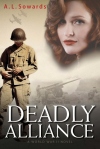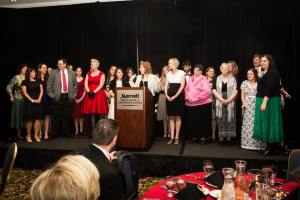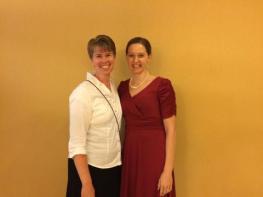 I recently emailed my editor the manuscript for my fifth book. Now that I’m done with that (at least for a while), I thought I’d catch up on some blogging. I’ll post more on the book tomorrow, but today I’m blogging about the Whitney Awards. I’m about a month late, but between taking care of the kids and trying to finish up revisions for my WWI novel, it didn’t make the top of my to-do list until now.
I recently emailed my editor the manuscript for my fifth book. Now that I’m done with that (at least for a while), I thought I’d catch up on some blogging. I’ll post more on the book tomorrow, but today I’m blogging about the Whitney Awards. I’m about a month late, but between taking care of the kids and trying to finish up revisions for my WWI novel, it didn’t make the top of my to-do list until now.
This year I was part of the Whitney Awards in two ways. One of my books, Deadly Alliance, was a finalist. I was also part of the academy. I’d like to share my thoughts on both aspects.

What are the Whitney Awards and how do they work?
I’ll start off with some background. The Whitney Awards website goes into more detail, but to sum it up, the Whitney Awards were created to highlight good fiction written by LDS authors.
The process begins with reader nominations. ANYONE can nominate a book (unless they have a financial interest in the book—an author can’t nominate his or her own book, nor can a publisher). Any book by an LDS author is eligible to be nominated during the year it is published, whether the book is a New York Times bestseller or an independently published novel that few people have heard of. The book doesn’t have to be about Mormons; it just has to be written by a Mormon.
When a book is nominated by five readers, it becomes a Whitney nominee. The Whitney committee emails the author to verify that the book meets all the requirements (mostly to make sure it’s long enough and that it was published in the appropriate year). Some books could fit into more than one genre, so the author is asked to choose which category they think best. There are currently eight categories: General, Historical, Romance, Mystery/Suspense, Speculative, Young Adult General, Young Adult Speculative, and Middle Grade. (Speculative includes sci-fi, fantasy, horror, dystopian, steampunk, vampires, ghosts, etc.)
Official nominees are read by a panel of five judges responsible for that category. The judges rank the books in order from most deserving to least deserving of an award, the numbers go in a computer, the computer spits out the top five novels, and they become finalists.

The finalists are usually announced in the February following the award year. Then members of the Whitney Academy pick any or all of the categories they wish to vote on and read all the finalists in that set. Academy members rank the finalists rather than simply voting for their favorite. Academy members who have read all five of the categories for adults (25 books) can vote for Best Novel of the Year. If they’ve read all three of the categories for youth (15 books), they can vote for Best Novel for Youth. All books written by debut authors are also eligible for Best Novel by a New Author.
A few years ago I explained the program to a friend. At that time, there were seven categories rather than eight. She asked, “Are there even 35 books published by LDS authors per year?” With that in mind, here are some numbers. For the 2014 awards, 391 books received at least one nomination. Of those, 193 received the needed five nominations to become an official nominee. The judges whittled it down to 40 finalists, and the academy voted on which books received the 11 awards (8 genre awards, Best Novel by a New Author, Best Novel, and Best Youth Novel).
My thoughts as an Academy member
I’ve been part of the academy since the 2011 awards. That year I read and judged the Historical and the Mystery/Suspense categories. For the 2012 awards, I had a finalist (Espionage) in the Historical genre, so I read Mystery/Suspense and General Fiction. In the 2013 season, I read Historical and Mystery/Suspense (anyone figuring out which genres I like best?). This year I again had a Historical finalist, so I read Mystery/Suspense, General Fiction, and Romance. I also read some of the other finalists in the Historical category, but I didn’t vote on those.

After four awards seasons, here are a few of my thoughts, some of them slightly random.
The committee does a lot of work. And they are all volunteers. Most of them are writers, and they give up not only their time, but also their eligibility for that year. They deserve a pat on the back.
The finalists and winners are good places to start if you’re looking for a to-read list, but reading and writing are very subjective. The list of finalists is the result of five opinions. Five. Not that many people. If you were to read the same list of books, you might come up with a completely different top five. I’ve read and nominated books in the past that weren’t finalists, but were more enjoyable reads for me than some that were finalists for that category and year. (I say that not to suggest the judges are wrong. I’m just pointing out that different readers have different opinions.)
By the time the judges have whittled it down to five books, any obviously inferior novels have been weeded out, so what’s left are often five books of similar quality. There are stand-out novels, but what I’ve found as an academy member is that the differences between books are often small when it comes time to rank them. A lot of it boils down to reader preferences. Does the academy member prefer cozy mysteries or classic suspense? Contemporary romance or historical romance? The book with the better plot or the book with the better description?
Normally, sequels (or later books in a series) have a lesser chance at winning. For the 2014 awards, however, that wasn’t true, with Josi Kilpack, Brandon Sanderson, and Sarah M. Eden all taking an award (or awards, in Sarah Eden’s case) with novels that weren’t the initial book in a series.
Normally, authors with two books nominated in a given category are less likely to win. I think it’s a result of splitting the vote. But to publish two high-quality books in one year and get both of them on the finalist list is still impressive.
This year I was seated near the laptop hooked up to the projector. I could see the current slide and the next slide, so I knew who most of the winners were before the presenters did. Only a few seconds before, but still—prime seating. (I told you some of my thoughts were random.)
My thoughts as a finalist
The Whitney Awards aren’t yet a household term, even in the LDS community. Just google it—you’ll find more about Whitney Houston than about novels. I don’t think being a finalist makes much of a difference in sales. But it is incredibly validating to have a panel of judges consider your book one of the best in the genre. And it introduces your book and your writing to an avid set of readers.
That can be a bit of a two-edged sword.
On one hand, academy members are judging the book, so they are forced to read it with a critic’s eye. Sometimes the book is one academy members would never pick up on their own because the topic or sub-genre isn’t their cup of tea. Maybe they prefer literary fiction over genre fiction, or vice versa. Sometimes they don’t like it. It shouldn’t be surprising, then, that Whitney finalists occasionally receive scathing reviews.
On the other hand, sometimes an academy member writes a review or reaches out in a private message with compliments about the book. That’s incredibly rewarding.

One of the stated goals of the Whitney Awards is to encourage LDS authors to write better books. For me, knowing about the awards is an added push to make my novels as good as I can make them. I wouldn’t call the program perfect, but for a non-profit group ran entirely by volunteers, they do an excellent job.
For a full list of this year’s Whitney finalists and winners, head over to the Whitney website. I didn’t win, but as mentioned earlier, I read some of the other finalists in the Historical Fiction category. They were good. I’m honored that Deadly Alliance was included among them.

I loved reading this and hearing all your random thoughts. It sounds like a very fun event and I want to thank all of you who put the time into reading and judging and doing all that fun stuff to help LDS readers find good, clean stories. I’m always excited to see the Whitney finalists each year and see how many of them I’ve already read, and get ideas for future reading.
LikeLiked by 1 person
Thanks for your comments, Char! Yes, it’s fun to see the list every year. And it’s fun to try out new authors and genres I don’t often read. Or to finally get around to reading that book that I heard good things about but hadn’t yet made time for. (You’ve seen how long my to-read list is on goodreads, right?)
LikeLike
After re-reading this post, I’m hoping no one gets the wrong message from my discussion on the finalists and the judging process. I think that the judges do a good job of highlighting the year’s best. I just don’t want readers to fall into the trap of thinking “I didn’t like two of the Whitney books in this genre, so there’s no way I’d like any of the books that didn’t even make the list.” And I don’t want authors who didn’t make the list to think that their book is a failure because it wasn’t a Whitney finalist.
LikeLike
I enjoyed this blog Amanda. It expanded my knowledge of the Whitney awards, I had no idea they were so involved. Looking forward to your next book!
LikeLiked by 1 person
Thanks Sheila! I’m glad the post helped you learn more about the Whitney awards! I should have more news on the next book by the end of the summer.
LikeLike